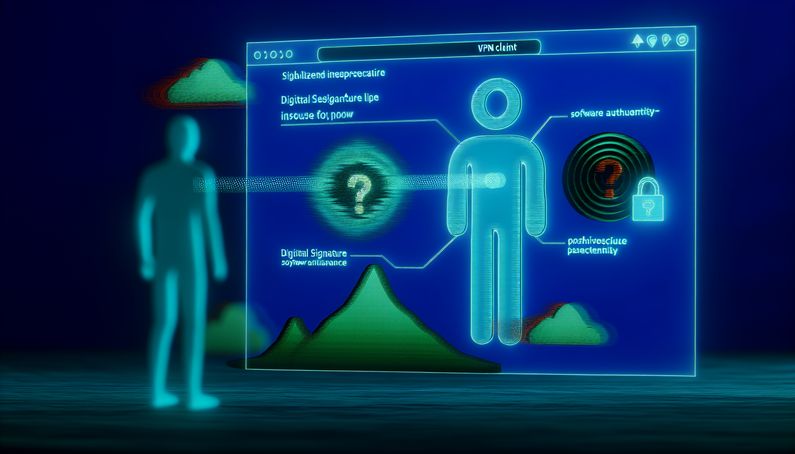
Understanding the Threat of Trojanized VPN Clients: A Case Study on SonicWall's NetExtender
The discovery of a trojanized version of SonicWall’s NetExtender VPN client has sent ripples through the cybersecurity community. This malicious variant, distributed via a spoofed website mimicking SonicWall’s official site, poses a significant threat by stealing VPN login credentials. The attackers cleverly bypassed basic security defenses by using a digital signature from “CITYLIGHT MEDIA PRIVATE LIMITED,” which allowed the software to appear legitimate (Bleeping Computer). This incident highlights a critical vulnerability in the reliance on digital signatures for software verification, as attackers can manipulate this trust mechanism to their advantage (Help Net Security).
Understanding the Threat: How Trojanized VPN Clients Compromise Security
The Mechanism of Trojanized VPN Clients
Trojanized VPN clients, such as the compromised version of SonicWall’s NetExtender, represent a significant threat to cybersecurity. These malicious applications are designed to mimic legitimate software, making them difficult to detect. Imagine downloading what you think is a trusted app, only to find out it’s a cleverly disguised imposter. The trojanized version of NetExtender, for instance, was discovered to be distributed through a spoofed website that closely resembled SonicWall’s official site. This fake website hosted a malicious installer file, which was not digitally signed by SonicWall but instead by “CITYLIGHT MEDIA PRIVATE LIMITED,” allowing it to bypass basic security defenses (Bleeping Computer).
Exploitation of Digital Signatures
The use of digital signatures is a common method for verifying the authenticity of software. However, in the case of the trojanized NetExtender, the attackers exploited this trust mechanism by using a legitimate-looking digital signature from an unrelated entity. It’s like receiving a letter with a forged signature that looks real enough to fool you. This tactic allowed the malicious software to appear authentic, thereby increasing the likelihood of users downloading and installing it. This highlights a critical vulnerability in the reliance on digital signatures for software verification, as attackers can manipulate this system to their advantage (Help Net Security).
Data Exfiltration Techniques
Once installed, the trojanized VPN client is capable of exfiltrating sensitive data. In the case of the compromised NetExtender, additional code was added to the application to send VPN configuration information, including usernames, passwords, and domain details, to a remote server with the IP address 132.196.198.163 over port 8080. This data exfiltration occurs as soon as the user enters their VPN credentials and clicks the “Connect” button, effectively compromising the security of the user’s network access (Bleeping Computer).
The Role of Spoofed Websites and Social Engineering
The distribution of trojanized VPN clients often relies on spoofed websites and social engineering tactics. Attackers create websites that closely resemble legitimate ones, complete with similar URLs and design elements, to trick users into downloading malicious software. It’s akin to a wolf in sheep’s clothing, where the disguise is so convincing that it lures you in. Additionally, methods such as malvertising, SEO poisoning, and direct messages are used to redirect users to these spoofed sites. Social engineering tactics, such as posing as official representatives or using persuasive language, further increase the likelihood of users falling victim to these schemes (Bleeping Computer).
Mitigation Strategies and Best Practices
To protect against the threat of trojanized VPN clients, it is essential to adopt robust mitigation strategies. Users should only download software from official vendor websites and avoid clicking on promoted search results, which may lead to spoofed sites. Additionally, it is crucial to scan all downloaded files with up-to-date antivirus software before execution. Organizations should also implement security tools capable of detecting and blocking malicious installers, such as Microsoft Defender, which has been updated to identify the trojanized NetExtender (Bleeping Computer).
The Impact on Organizational Security
The compromise of VPN clients like SonicWall’s NetExtender poses a significant threat to organizational security. VPNs are critical for enabling secure remote access to internal networks, and any breach of this system can lead to unauthorized access to sensitive data and resources. The exploitation of VPN clients can result in data breaches, financial losses, and reputational damage. Organizations must remain vigilant and proactive in securing their VPN infrastructure to prevent such incidents (Intertrust Technologies).
The Broader Implications for VPN Security
The issue of trojanized VPN clients underscores the broader vulnerabilities inherent in VPN protocols. Many VPNs are susceptible to attacks that can lead to unauthorized access and data breaches. To mitigate these risks, additional security mechanisms, such as IPsec or WireGuard, should be employed to provide end-to-end encryption of VPN traffic data. This ensures that only the server can read the encrypted data, enhancing the overall security of the VPN connection (PCWorld).
Conclusion
The case of the trojanized SonicWall NetExtender serves as a stark reminder of the vulnerabilities inherent in VPN security. Organizations must adopt comprehensive strategies to protect their VPN infrastructure, including regular updates, robust authentication mechanisms, and continuous monitoring for potential threats. By understanding and addressing these vulnerabilities, organizations can better protect their sensitive data and maintain the integrity of their network security. The broader implications for VPN security underscore the need for additional security mechanisms, such as IPsec or WireGuard, to provide end-to-end encryption of VPN traffic data (PCWorld).
References
- Bleeping Computer. (2025). SonicWall warns of trojanized NetExtender stealing VPN logins. https://www.bleepingcomputer.com/news/security/sonicwall-warns-of-trojanized-netextender-stealing-vpn-logins/
- Help Net Security. (2025). Trojanized SonicWall NetExtender app exfiltrates VPN credentials. https://www.helpnetsecurity.com/2025/06/24/trojanized-sonicwall-netextender-app-exfiltrates-vpn-credentials/
- Intertrust Technologies. (2025). Unveiling inherent vulnerabilities in VPN protocols: Risks and ramifications. https://www.intertrust.com/blog/unveiling-inherent-vulnerabilities-in-vpn-protocols-risks-and-ramifications/
- PCWorld. (2025). Many VPNs are vulnerable to hackers and hijackers, study claims. https://www.pcworld.com/article/2583930/many-vpns-are-vulnerable-to-hackers-and-hijackers-study-claims.html



